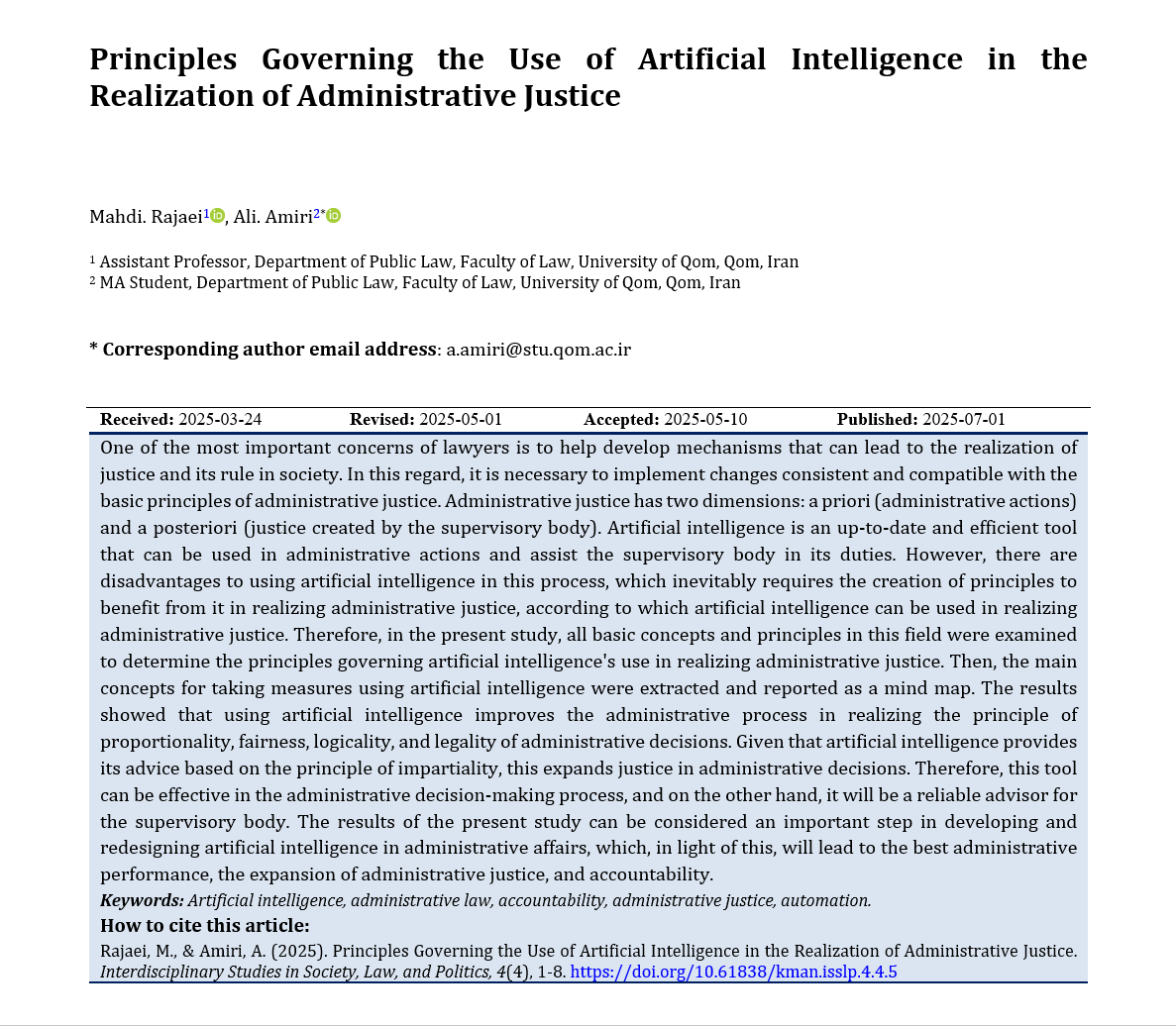Principles Governing the Use of Artificial Intelligence in the Realization of Administrative Justice
Keywords:
Artificial intelligence, administrative law, accountability, administrative justice, automationAbstract
One of the most important concerns of lawyers is to help develop mechanisms that can lead to the realization of justice and its rule in society. In this regard, it is necessary to implement changes consistent and compatible with the basic principles of administrative justice. Administrative justice has two dimensions: a priori (administrative actions) and a posteriori (justice created by the supervisory body). Artificial intelligence is an up-to-date and efficient tool that can be used in administrative actions and assist the supervisory body in its duties. However, there are disadvantages to using artificial intelligence in this process, which inevitably requires the creation of principles to benefit from it in realizing administrative justice, according to which artificial intelligence can be used in realizing administrative justice. Therefore, in the present study, all basic concepts and principles in this field were examined to determine the principles governing artificial intelligence's use in realizing administrative justice. Then, the main concepts for taking measures using artificial intelligence were extracted and reported as a mind map. The results showed that using artificial intelligence improves the administrative process in realizing the principle of proportionality, fairness, logicality, and legality of administrative decisions. Given that artificial intelligence provides its advice based on the principle of impartiality, this expands justice in administrative decisions. Therefore, this tool can be effective in the administrative decision-making process, and on the other hand, it will be a reliable advisor for the supervisory body. The results of the present study can be considered an important step in developing and redesigning artificial intelligence in administrative affairs, which, in light of this, will lead to the best administrative performance, the expansion of administrative justice, and accountability.
Downloads
References
Aneesh, A. (2009). Global labor: Algocratic modes of organization. Sociological theory, 27(4), 347-370. https://doi.org/10.1111/j.1467-9558.2009.01352.x
Barak-Erez, D. (2005). The administrative process as a domain of conflicting interests. Theoretical Inquiries in Law, 6(1), 193-214. https://doi.org/10.2202/1565-3404.1104
Baseri, B., & Faghih Habibi, A. (2023). The function of administrative justice concept in administrative justice court proceeding. The Journal of Modern Research on Administrative Law, 5(15), 85-107. https://doi.org/10.22034/mral.2023.562730.1386
Bignami, F. (2022). Artificial intelligence accountability of public administration. The American Journal of Comparative Law, 70(Supplement_1), i312-i346. https://doi.org/10.1093/ajcl/avac012
Daly, P. (2023). Artificial Administration: Administrative Law, Administrative Justice and Accountability in the Age of Machines. Australian Journal of Administrative Law & Practice.
Forsyth, C. F., Wade, W., Forsyth, C., & Ghosh, J. (2023). Wade & Forsyth's Administrative Law. Oxford University Press.
Goudge, A. (2021). Administrative Law, Artificial Intelligence, and Procedural Rights. Windsor Rev. Legal & Soc., 42(17).
Kyriakidou, O. (2025). Algorithms and global diversity management. https://doi.org/10.4337/9781035311170.00018
Mohebbi, D., & Amiri, A. (2025). Legal and Ethical Challenges Related to the Use of Artificial Intelligence in the Administrative Justice System.
Raso, J. (2021). AI and administrative law. LexisNexis Canada.
Rostami, V., & Ranjbar, A. (2014). Administrative Justice: Conceptual Framework and Institutional Mechanisms. Quarterly Journal of Public Law Knowledge, 3(7), 115-134.
Sheykhvand, M., Minaei, B., Ashoori, M., & Mahdavisabet, M. (2023). Artificial Intelligence and Issuing the Criminal Sentences: Decision-making or Decision-taking? Comparative Law Research Quarterly, 27(4), 138-167.
Vijeh, M. R., & Ahmadi Kamarposhti, H. (2023). Bureaucracy and Discretionary Competence. Administrative Law Quarterly, 11(36), 159-175. https://doi.org/10.61186/qjal.11.36.159

Downloads
Additional Files
Published
Submitted
Revised
Accepted
Issue
Section
License
Copyright (c) 2025 Mahdi Rajaei (Author); Ali Amiri (Corresponding author)

This work is licensed under a Creative Commons Attribution-NonCommercial 4.0 International License.





